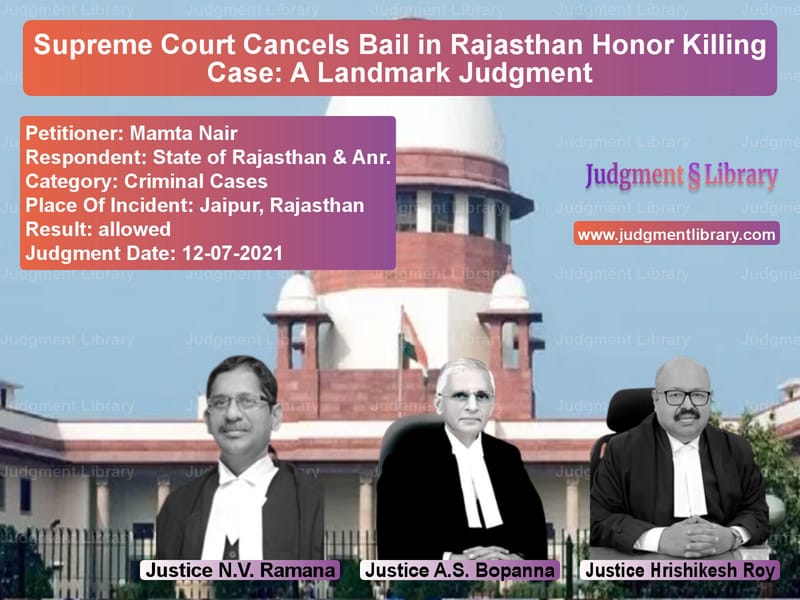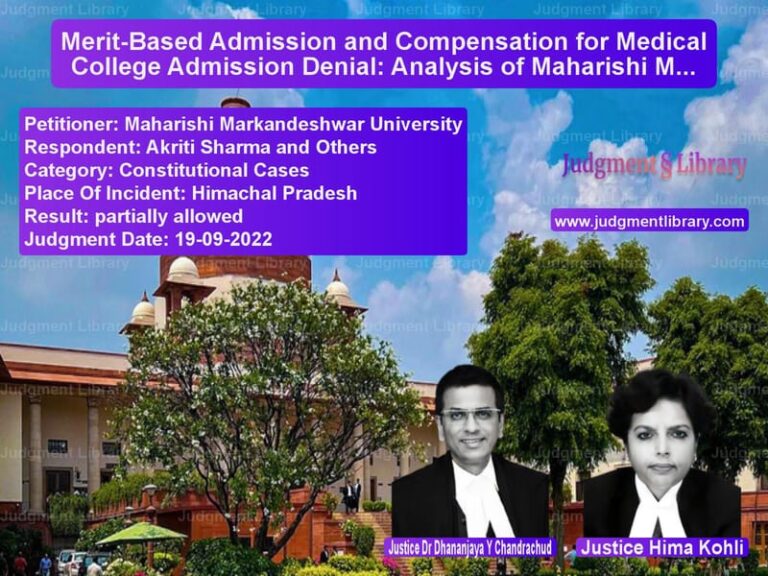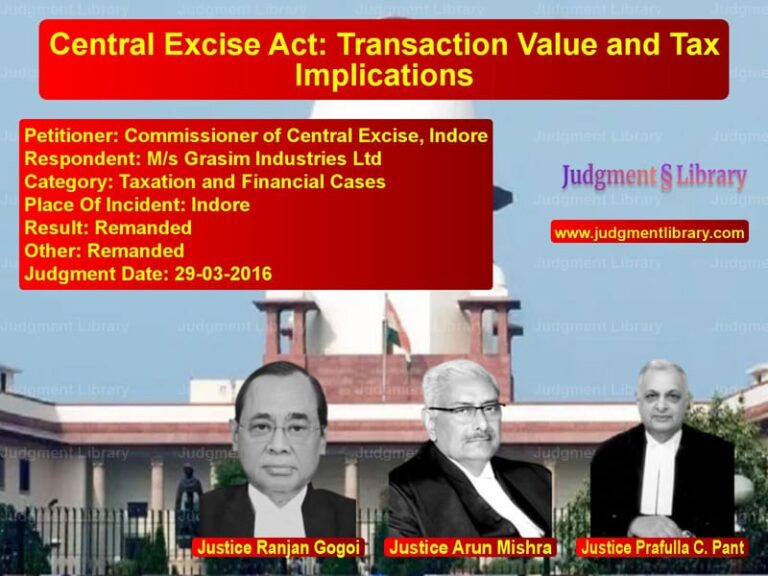Supreme Court Cancels Bail in Rajasthan Honor Killing Case: A Landmark Judgment
The case of Mamta Nair v. State of Rajasthan & Anr. is a crucial legal development concerning honor killings and the judicial system’s approach to granting bail in serious criminal offenses. The Supreme Court’s verdict in this case overturned the bail granted to one of the prime accused in the murder of the appellant’s husband, emphasizing that courts must exercise caution while granting bail in grave offenses. The judgment provides clarity on how courts should balance individual liberty with the broader interests of justice.
Background of the Case
The case revolves around the murder of the appellant’s husband in an alleged honor killing. The complaint was filed by Smt. Rama Devi Nair, the mother-in-law of the appellant, against the accused Mukesh Chaudhary (respondent No. 2) and others. According to the complainant, the accused, along with his accomplices, conspired to kill the deceased because he had married the appellant against the wishes of her family. The complaint was registered under FIR No. 235 of 2017 at Karni Vihar Police Station, Rajasthan, under Sections 302 (murder), 452 (house trespass), and 120B (criminal conspiracy) of the Indian Penal Code.
Read also: https://judgmentlibrary.com/bail-conditions-and-victim-compensation-supreme-courts-landmark-ruling/
The case has witnessed multiple rounds of litigation, with the accused Mukesh Chaudhary initially being granted bail by the Rajasthan High Court in November 2017. However, this bail was later canceled by the Supreme Court after reviewing the seriousness of the allegations and the evidence available.
Legal Proceedings and Bail Grant
- On November 3, 2017, the Rajasthan High Court granted bail to Mukesh Chaudhary.
- The petitioner and her mother-in-law challenged this bail before the Supreme Court.
- The Supreme Court, upon reviewing the prima facie evidence, canceled the bail earlier.
- Despite this, the accused filed a fresh bail application before the High Court, which was granted on December 1, 2020.
- The petitioner once again approached the Supreme Court, arguing that the High Court had granted bail without considering the previous Supreme Court order.
Petitioner’s Arguments
The petitioner, represented by senior advocate Indira Jaising, raised several key points before the Supreme Court:
- The High Court had granted bail without adequately considering the seriousness of the allegations.
- The Supreme Court had already canceled the accused’s bail earlier, making the High Court’s decision legally untenable.
- The accused was one of the main conspirators in the murder and had a strong influence on witnesses, posing a serious threat to the trial process.
- The order granting bail was “mechanical” and lacked any substantial reasoning.
- Allowing bail in such a case set a dangerous precedent for honor killing cases, which require stringent judicial scrutiny.
Respondent’s Defense
The defense, representing Mukesh Chaudhary, made the following arguments:
- The trial had already progressed, and new evidence had emerged.
- The prosecution’s case was weak, and the testimony of some witnesses had diluted the allegations.
- There was no direct evidence linking the accused to the conspiracy.
- The accused had been in custody for a considerable time and was entitled to bail.
Supreme Court’s Observations
The Supreme Court, after analyzing the facts, ruled against the accused and set aside the Rajasthan High Court’s order granting him bail.
“The reading of the FIR and the charge sheet shows that prima facie there is material against respondent No. 2. In view of that, we are of the opinion that for the time being, it is not proper to extend the liberty of bail to the respondent No. 2.”
The Court noted that the High Court had granted bail in a “mechanical manner” without providing adequate reasons. The judges emphasized that granting bail in serious cases such as honor killings required a careful and reasoned approach, taking into account the interests of the victim’s family and society at large.
Key Takeaways from the Judgment
- Courts must exercise extreme caution while granting bail in cases involving serious criminal offenses such as honor killings.
- The presence of substantial evidence against an accused is a crucial factor in deciding bail applications.
- The Supreme Court has the authority to review and cancel bail if granted without valid reasoning.
- Judicial orders must not be “mechanical” and must include substantial reasons for granting or denying bail.
- The justice system must ensure that granting bail does not obstruct the trial process or intimidate witnesses.
Impact of the Judgment
The Supreme Court’s decision has significant implications for the criminal justice system, particularly in cases involving honor killings. This ruling reinforces the need for stringent judicial scrutiny while granting bail in heinous crimes. The verdict also highlights the importance of safeguarding the interests of victims’ families and ensuring that accused persons do not misuse bail provisions to interfere with the trial.
The judgment sends a strong message that bail cannot be granted lightly in serious offenses, especially when substantial evidence exists against the accused. The decision ensures that justice prevails by preventing accused individuals from misusing bail to influence witnesses or evade accountability.
Conclusion
The Supreme Court’s decision to cancel bail in this case upholds the principles of justice and fairness in serious criminal cases. By emphasizing that courts must adopt a cautious and well-reasoned approach in granting bail, the ruling serves as a guiding precedent for future cases involving honor killings and other serious crimes.
The case of Mamta Nair v. State of Rajasthan & Anr. demonstrates the judiciary’s commitment to ensuring that procedural lapses do not allow accused persons to evade justice. It reaffirms the fundamental legal principle that personal liberty must be balanced with the broader interests of justice and the rule of law.
Petitioner Name: Mamta Nair.Respondent Name: State of Rajasthan & Anr..Judgment By: Justice N.V. Ramana, Justice A.S. Bopanna, Justice Hrishikesh Roy.Place Of Incident: Jaipur, Rajasthan.Judgment Date: 12-07-2021.
Don’t miss out on the full details! Download the complete judgment in PDF format below and gain valuable insights instantly!
Download Judgment: mamta-nair-vs-state-of-rajasthan-&-supreme-court-of-india-judgment-dated-12-07-2021.pdf
Directly Download Judgment: Directly download this Judgment
See all petitions in Murder Cases
See all petitions in Bail and Anticipatory Bail
See all petitions in Attempt to Murder Cases
See all petitions in Judgment by N.V. Ramana
See all petitions in Judgment by A. S. Bopanna
See all petitions in Judgment by Hrishikesh Roy
See all petitions in allowed
See all petitions in supreme court of India judgments July 2021
See all petitions in 2021 judgments
See all posts in Criminal Cases Category
See all allowed petitions in Criminal Cases Category
See all Dismissed petitions in Criminal Cases Category
See all partially allowed petitions in Criminal Cases Category







